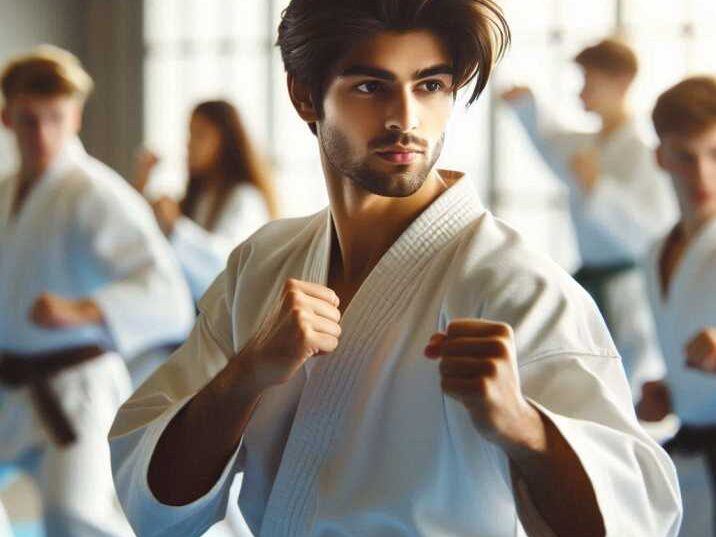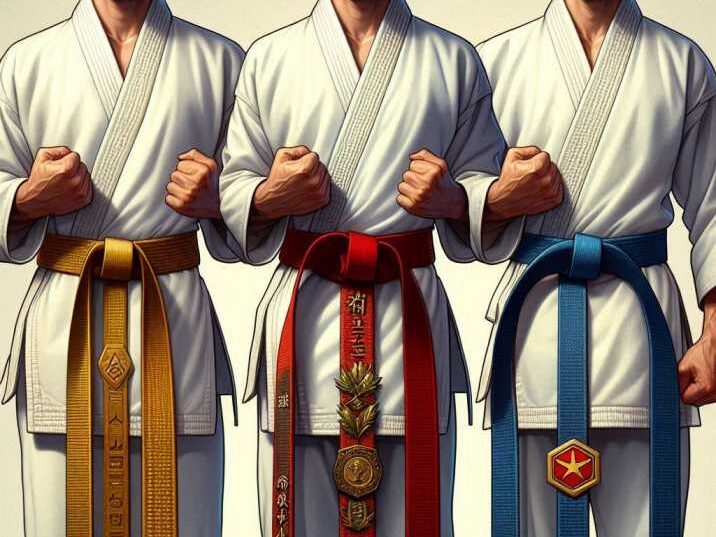Karate is a popular martial art practiced around the world. Many people are curious about whether learning Karate is challenging and think it’s very hard to learn karate? A Comprehensive Guide for Beginners. In this article, we’ll explore what makes Karate unique, the factors that affect learning it, and provide tips to help you on your Karate journey. Whether you’re a young student or an adult, this guide will help you understand what to expect when starting Karate.

Table of Contents
Table of Contents
- Introduction to Karate
- Is Karate Hard to Learn?
- Factors Affecting the Difficulty
- Skills and Attributes Required
- Benefits of Learning Karate
- How to Make Learning Karate Easier
- FAQs
- Conclusion
Introduction to Karate
Karate is a traditional martial art that originated in Japan. It combines physical techniques such as punching, kicking, and striking with mental discipline. Karate is not only a form of self-defense but also a way to improve fitness and gain confidence. Its practice includes various techniques, forms (known as kata), and sparring.
Is Karate Hard to Learn?
Learning Karate can be a challenging yet rewarding experience. Several factors can influence how difficult it is to learn, ranging from personal attributes to external conditions. Let’s delve into each of these factors to understand how they affect the learning process:
1. Age
Impact of Age on Learning:
- Younger Students: Children and teenagers often find it easier to learn Karate due to their natural flexibility and ability to pick up new skills quickly. Their bodies are more adaptable, which can make mastering techniques and movements less challenging.
- Adults: While adults may have less flexibility compared to younger students, they can still learn Karate effectively. Adults bring other advantages, such as greater mental discipline and focus, which can compensate for physical limitations.
Why It Matters: Age affects how quickly you can learn new skills and techniques. However, regardless of age, dedication and regular practice can lead to significant progress in Karate.
2. Physical Fitness
Role of Fitness in Learning:
- Basic Fitness: A good level of physical fitness can make learning Karate smoother. Strength, endurance, and flexibility are crucial for performing techniques correctly and safely.
- Strength and Flexibility: Having a strong core, flexible limbs, and good cardiovascular health can make it easier to execute Karate moves and recover from intense training sessions.
Why It Matters: Being in good physical shape can reduce the risk of injury and improve your ability to performand learn karate techniques. Fitness supports your progress and helps you handle the physical demands of the practice.
3. Previous Experience
Influence of Prior Experience:
- Other Martial Arts: If you have a background in other martial arts, you might find Karate easier to learn. Skills such as body control, balance, and discipline transfer well between martial arts.
- Sports Experience: Experience in sports that require coordination, agility, and focus can also make Karate more accessible. The principles of movement and strategy are often similar across various activities.
Why It Matters: Previous experience in martial arts or sports can provide a solid foundation for learning Karate. Familiarity with physical training and discipline helps you adapt more quickly to Karate techniques.
4. Instructor Quality
Importance of a Good Instructor:
- Clear Instructions: A skilled instructor provides clear, effective teaching and guidance, making it easier to learn and understand Karate techniques.
- Constructive Feedback: Good instructors offer helpful feedback and corrections, which can accelerate your learning and ensure you’re practicing techniques correctly.
Why It Matters: The quality of instruction greatly impacts your learning experience. A knowledgeable and supportive instructor helps you overcome challenges and progress more efficiently in your Karate practice.
5. Practice Time
Effect of Practice Consistency:
- Regular Training: Consistent practice is crucial for mastering Karate. Regular attendance in classes and additional practice at home build muscle memory and reinforce learning.
- Time Investment: The more time you dedicate to practicing Karate, the faster you will improve. Consistent effort helps you understand and execute techniques better.
Skills and Attributes Required
To learn Karate effectively, several skills and attributes can be beneficial:
- Discipline: Karate requires focus and discipline. Regular practice and adherence to the training regimen are crucial.
- Patience: Mastering Karate takes time. Being patient with yourself as you learn and improve is essential.
- Determination: Persistence in practice helps overcome challenges and enhances skill development.
- Coordination: Good hand-eye coordination is important for executing techniques accurately.
Benefits of Learning Karate
Learning Karate is more than just acquiring self-defense skills. It offers a range of physical, mental, and social benefits that can enhance your overall quality of life. Here’s a detailed explanation of the key benefits:
1. Improved Fitness
Enhancing Physical Health: Karate is a full-body workout that promotes overall fitness. The benefits include:
- Strength: Training in Karate involves various physical techniques like punches, kicks, and blocks, which help build muscle strength.
- Flexibility: Karate requires a range of motion for executing high kicks and other techniques, which improves flexibility over time.
- Endurance: The intense physical activity involved in Karate classes helps increase stamina and cardiovascular endurance.
Why It Matters: Regular Karate practice improves physical health, contributing to a stronger, more flexible body. It supports a healthier lifestyle and can help prevent various health issues related to a sedentary lifestyle.
2. Increased Confidence
Building Self-Esteem: As you progress through Karate, you’ll experience a boost in self-confidence. This happens through:
- Skill Development: Mastering techniques and achieving belt ranks gives you a sense of accomplishment.
- Self-Efficacy: Successfully defending yourself and overcoming challenges in training enhances your belief in your abilities.
Why It Matters: Increased confidence from Karate can positively impact other areas of life, including personal relationships, academic performance, and professional endeavors. It helps you face challenges with a more positive and assured attitude.
3. Stress Relief
Managing Stress Through Physical Activity: Karate involves physical exertion that helps reduce stress. This benefit includes:
- Physical Release: The intense activity helps release endorphins, which are natural mood lifters.
- Mental Focus: Concentrating on techniques and forms during practice provides a mental break from everyday stressors.
Why It Matters: Engaging in Karate can help manage stress and improve mental health by providing a constructive outlet for tension and anxiety. It contributes to overall emotional well-being and helps you maintain a balanced lifestyle.
4. Self-Discipline
Developing Personal Discipline: Karate teaches self-discipline through:
- Structured Training: Following a regular training schedule and adhering to techniques and forms require commitment and focus.
- Goal Setting: Setting and achieving goals, such as advancing to a higher belt, fosters discipline and persistence.
Why It Matters: Self-discipline learned in Karate can be applied to other areas of life, including academics, work, and personal goals. It helps you develop a strong work ethic and the ability to stay focused on long-term objectives.
5. Social Interaction
Building Social Connections: Joining a Karate class provides opportunities to interact with others, leading to:
- Meeting New People: You’ll meet fellow students, make friends, and build a sense of community within the dojo.
- Team Spirit: Karate classes often involve group activities and sparring, fostering camaraderie and teamwork.
Why It Matters: Social interaction in Karate enhances your social skills and helps build a supportive network. It provides a sense of belonging and encourages positive relationships, which can contribute to overall happiness and well-being.
How to Make Learning Karate Easier
Learning Karate can be an exciting and rewarding experience, but it’s important to approach it in a way that maximizes your success and enjoyment. Here’s a detailed look at how you can make your Karate journey smoother and more effective:
1. Find a Good Dojo
Choosing the Right Dojo: A dojo is a training facility where you practice Karate. Finding a good dojo is crucial for a positive learning experience. Look for a dojo with:
- Experienced Instructors: Instructors with a solid background in Karate can provide better guidance and training.
- Positive Atmosphere: A welcoming and supportive environment helps in building confidence and motivation.
- Good Reviews: Researching reviews from other students can give you an idea of the dojo’s reputation and quality.
Why It Matters: A reputable dojo ensures that you receive proper instruction and that the training environment is conducive to learning. This foundation helps you develop skills correctly and safely.
2. Set Realistic Goals
Setting Achievable Goals: When starting Karate, it’s important to set goals that are specific, measurable, achievable, relevant, and time-bound (SMART). For example:
- Short-Term Goals: Focus on mastering basic techniques or learning a new kata (form) within a certain timeframe.
- Long-Term Goals: Aim for higher belt ranks or participate in a Karate competition after a year of practice.
Why It Matters: Setting realistic goals helps you stay motivated and track your progress. Achieving these goals gives you a sense of accomplishment and encourages you to continue improving.

3. Stay Consistent
Regular Practice: Consistency is key in Karate. Aim to attend your Karate classes regularly and practice at home between sessions. Create a routine that includes:
- Class Attendance: Follow the schedule provided by your dojo.
- Home Practice: Dedicate time each week to practice techniques, katas, or conditioning exercises at home.
Why It Matters: Consistent practice helps reinforce what you’ve learned in class and improves your skills over time. It also builds muscle memory, making techniques easier to perform.
4. Ask for Help
Seeking Clarification: If you’re struggling with a technique or concept, don’t hesitate to ask your instructor for help. Effective communication can include:
- Questions: Ask specific questions about techniques or forms you find challenging.
- Feedback: Request constructive feedback to understand how you can improve.
Why It Matters: Asking for help ensures that you receive the guidance you need to overcome difficulties. It also shows your commitment to learning and helps you correct mistakes early on.
5. Keep a Positive Attitude
Maintaining Positivity: A positive attitude can make a big difference in your Karate journey. Focus on:
- Enjoying the Process: Appreciate the learning process and celebrate small victories.
- Overcoming Challenges: View challenges as opportunities for growth rather than obstacles.
Why It Matters: A positive mindset helps you stay motivated and resilient. It makes the learning experience more enjoyable and encourages you to keep working towards your goals, even when progress seems slow.
Conclusion
Learning Karate is a rewarding experience that combines physical training with mental discipline. While it can be challenging, the factors affecting its difficulty and the benefits it offers make it an excellent pursuit for many. By understanding the skills required and applying the tips provided, you can make your Karate journey more manageable and enjoyable.
FAQs
- Is Karate suitable for all ages?
- Yes, Karate can be practiced by people of all ages. It is important to choose a class that matches your age and fitness level.
- How long does it take to get a black belt in Karate?
- The time to earn a black belt varies but typically takes several years of consistent practice and training.
- Do I need to be fit before starting Karate?
- No, you don’t need to be fit before starting. Karate training itself will help improve your fitness level.
- Can Karate help with self-defense?
- Yes, Karate teaches self-defense techniques and improves your ability to protect yourself in various situations.
- What should I wear for Karate practice?
- Wear a traditional Karate gi (uniform) or comfortable athletic wear if you’re just starting out.


